Landscape Gardening in Hayes: Transform Your Outdoor Oasis
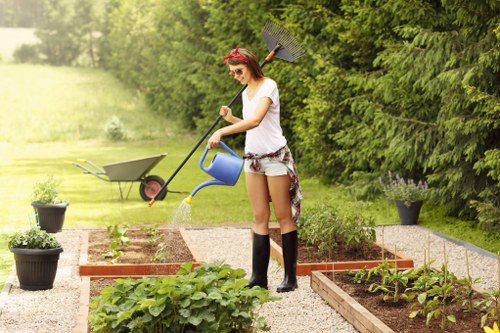
Introduction to Landscape Gardening in Hayes
Welcome to the world of landscape gardening in Hayes, where your outdoor spaces are transformed into stunning and functional retreats. Whether you have a sprawling backyard or a cozy garden, landscape gardening can enhance the beauty, value, and usability of your property.
In Hayes, the climate and soil conditions provide a unique opportunity for gardeners to experiment with a variety of plants and designs. From vibrant flower beds to serene water features, the possibilities are endless.
Embarking on a landscape gardening project involves careful planning and execution. Understanding the local environment, selecting the right plants, and incorporating sustainable practices are key to creating a landscape that thrives year-round.
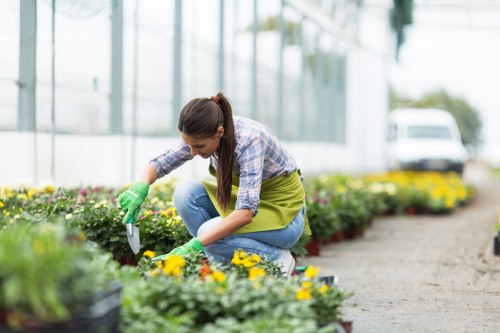
Planning Your Landscape Garden
Assessing Your Space
Before diving into any gardening project, it's essential to assess your outdoor space. Consider factors such as sunlight exposure, soil quality, drainage, and existing structures. This assessment will help you determine the best layout and plant selection for your garden.
In Hayes, many gardens benefit from a mix of sun and shade areas. Identifying these zones allows you to plant species that will thrive in each specific condition, ensuring a lush and vibrant garden.
Additionally, consider the purpose of your garden. Do you want a space for entertaining, relaxation, or growing your own vegetables? Defining the primary use of your garden will guide your design choices and plant selections.
Creating a Design Layout
A well-thought-out design layout is the foundation of successful landscape gardening. Start by sketching a rough plan of your garden, marking existing features and noting areas for new additions.
Incorporate elements such as pathways, sitting areas, and focal points like statues or water features. A balanced layout not only enhances the aesthetic appeal but also improves the functionality of your garden.
Consider using garden design software or consulting with a professional landscaper in Hayes to refine your layout and bring your vision to life.
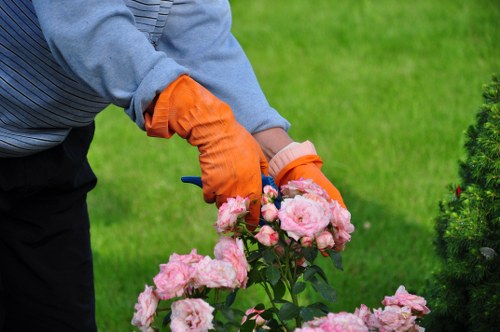
Choosing the Right Plants
Local Flora and Adaptation
Selecting plants that are well-suited to the Hayes climate is crucial for a thriving garden. Opt for native species that are adapted to the local soil and weather conditions, as they require less maintenance and are more resilient.
Some popular choices for landscape gardening in Hayes include lavender, hydrangeas, and ornamental grasses. These plants not only add beauty but also attract pollinators, contributing to a healthy ecosystem in your garden.
Incorporate a mix of perennials and annuals to ensure your garden remains vibrant throughout the seasons. Perennials provide lasting structure, while annuals offer bursts of color and variety.
Flowering Plants and Shrubs
Flowering plants are the heart of any landscape garden. Consider adding roses, tulips, and daisies for continuous blooms. Shrubs like boxwood and holly can provide year-round greenery and structure.
Mixing different plant heights and textures creates visual interest and depth. Layering plants from ground cover to tall shrubs ensures a dynamic and engaging garden space.
Don’t forget to include fragrant plants like jasmine or gardenias, which add an aromatic element to your outdoor sanctuary.
Edible Gardens
For those interested in growing their own food, incorporating an edible garden is a rewarding addition. Tomatoes, herbs, and berries can be seamlessly integrated into your landscape design, offering both beauty and practicality.
Edible gardens not only provide fresh produce but also promote sustainable living by reducing the need for store-bought goods.
Strategically place your edible plants in areas that receive ample sunlight and have easy access for harvesting.
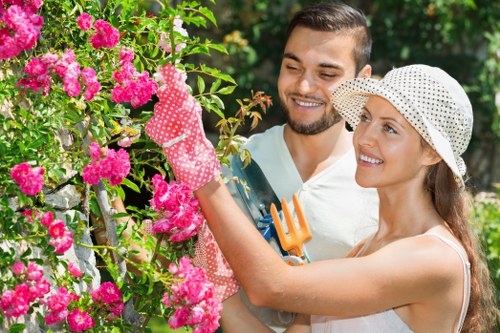
Maintenance Tips for a Thriving Garden
Regular Care and Upkeep
Maintaining a beautiful landscape garden in Hayes requires consistent care. Regular watering, especially during dry spells, is essential for plant health. Invest in an efficient irrigation system to ensure even distribution of water.
Pruning and trimming are vital for controlling plant growth and preventing overgrowth. Remove any dead or diseased branches to promote healthy development and prevent pest infestations.
Weeding is another important task. Regularly remove unwanted plants to reduce competition for nutrients and maintain the aesthetic appeal of your garden.
Soil Health and Fertilization
Healthy soil is the foundation of a thriving garden. Test your soil to determine its pH levels and nutrient content. Amend the soil with compost or organic matter to improve its structure and fertility.
Fertilize your plants according to their specific needs. Over-fertilizing can be harmful, so follow recommended guidelines to ensure optimal growth without damaging your plants.
Mulching helps retain soil moisture, suppress weeds, and regulate soil temperature. Apply a layer of mulch around your plants to enhance soil health and reduce maintenance efforts.
Pest and Disease Management
Protect your garden from pests and diseases by practicing integrated pest management. Encourage beneficial insects like ladybugs and butterflies to naturally control pest populations.
Monitor your plants regularly for signs of disease or infestation. Early detection allows for prompt treatment, preventing the spread of issues throughout your garden.
Use organic pesticides and natural remedies to maintain a healthy and eco-friendly garden environment.
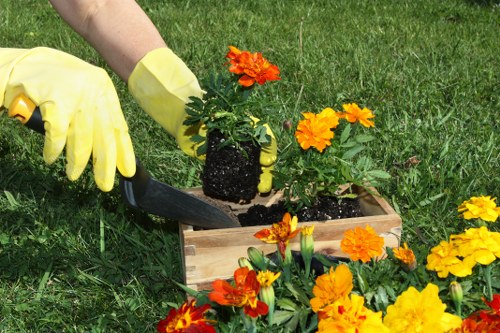
Enhancing Your Garden with Features and Accessories
Water Features and Lighting
Incorporating water features such as fountains, ponds, or waterfalls adds a soothing element to your landscape garden. The sound of flowing water creates a tranquil atmosphere, perfect for relaxation and unwinding.
Outdoor lighting is essential for extending the usability of your garden into the evening hours. Use a combination of ambient, task, and accent lighting to highlight key features and ensure safety along pathways.
Solar-powered lights are an eco-friendly option that reduces energy consumption while providing adequate illumination for your outdoor space.
Garden Structures and Furniture
Adding structures like pergolas, arbors, or gazebos provides shade and creates designated areas for seating and socializing. These elements contribute to the overall design and functionality of your garden.
Select garden furniture that complements your landscape design. Durable materials such as wrought iron, teak, and recycled plastic withstand the elements and maintain their appearance over time.
Include comfortable seating options, such as benches or lounge chairs, to create inviting spaces for relaxation and entertainment.
Decorative Elements
Integrate decorative elements like sculptures, birdbaths, and garden art to personalize your landscape garden. These accessories add character and reflect your individual style, making your garden uniquely yours.
Choose decorations that withstand outdoor conditions and require minimal maintenance. Weather-resistant materials ensure longevity and sustained beauty in your garden.
Seasonal decorations can also be incorporated to keep your garden looking fresh and vibrant throughout the year.
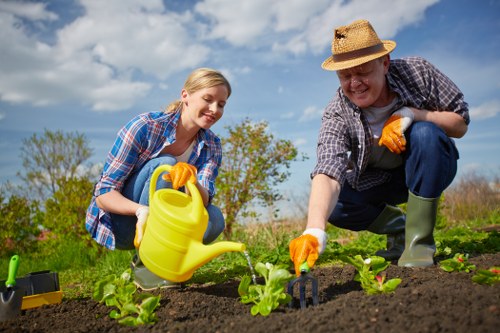
Hiring Professional Landscape Gardeners in Hayes
Benefits of Professional Services
While DIY landscape gardening can be fulfilling, hiring professional landscape gardeners in Hayes offers numerous advantages. Professionals bring expertise in design, plant selection, and maintenance, ensuring a polished and long-lasting garden.
They have access to high-quality materials and plants, often unavailable to the general public. This access allows for a wider range of design options and superior results.
Professional gardeners also save you time and effort, handling all aspects of the project from initial planning to final execution. This comprehensive service allows you to enjoy your garden without the stress of managing every detail.
Choosing the Right Contractor
Selecting the right landscape gardening contractor is crucial for achieving your desired outcome. Look for experienced professionals with a strong portfolio of completed projects in Hayes.
Check references and read reviews to gauge the quality of their work and customer satisfaction levels. A reputable contractor will be transparent, communicative, and dedicated to meeting your specific needs.
Ensure that the contractor is licensed and insured, providing protection and peace of mind throughout the project.
Customizing Your Garden
Professional landscape gardeners work closely with you to customize your garden according to your preferences and lifestyle. They consider your vision, budget, and the unique characteristics of your space to create a tailored design.
From selecting the perfect plants to installing intricate features, professionals handle every detail with precision and creativity.
This personalized approach ensures that your garden not only looks stunning but also serves your practical needs effectively.
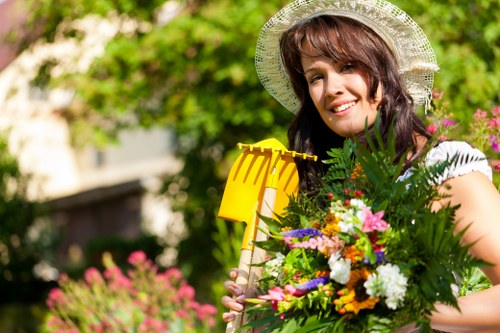
Sustainable Landscaping Practices
Eco-Friendly Planting
Embracing sustainable landscaping practices enhances the environmental health of your garden and contributes to a greener community in Hayes. Choose native and drought-resistant plants to reduce water usage and support local wildlife.
Implementing companion planting techniques helps naturally deter pests and promote healthier plant growth without the need for chemical interventions.
Use organic fertilizers and compost to enrich the soil, minimizing the reliance on synthetic additives that can harm beneficial microorganisms.
Water Conservation
Efficient water management is a cornerstone of sustainable landscape gardening. Install rainwater harvesting systems to collect and reuse water for irrigation, reducing dependency on municipal water sources.
Drip irrigation systems deliver water directly to plant roots, minimizing evaporation and ensuring optimal hydration for your plants.
Mulching not only conserves moisture but also improves soil health and reduces the frequency of watering needed, fostering a more sustainable garden environment.
Reducing Waste
Minimize garden waste by composting organic materials such as leaves, grass clippings, and kitchen scraps. Compost enriches the soil, creating a natural and nutrient-rich medium for plant growth.
Recycle materials when possible, repurposing old structures or using reclaimed wood and stones for garden features. This approach reduces environmental impact and adds unique character to your landscape.
Implementing a sustainable approach to landscape gardening not only benefits the planet but also creates a healthy and vibrant garden that you can enjoy for years to come.
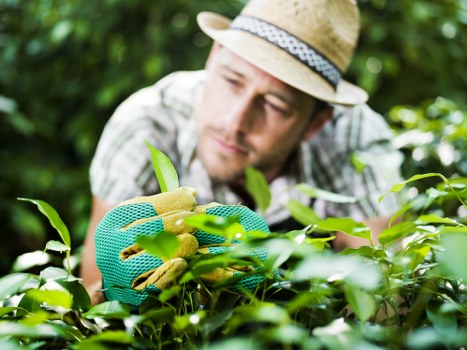
Seasonal Gardening Tips
Spring Preparations
Spring is the perfect time to rejuvenate your landscape garden in Hayes. Begin by clearing any debris from the winter months and prepping your soil for new plantings.
Plant early-blooming flowers and shrubs to take advantage of the season's mild temperatures and increased daylight. This proactive approach sets the foundation for a colorful and thriving garden throughout the year.
Regularly monitor your plants for signs of pests or diseases, addressing any issues promptly to ensure healthy growth.
Summer Care
During the summer months, focus on maintaining adequate moisture levels and providing shade for sensitive plants. Implementing efficient irrigation systems helps manage the increased water demand.
Prune overgrown branches and remove dead flowers to promote air circulation and prevent the spread of diseases.
Incorporate heat-tolerant plant varieties and consider adding mulching to protect the soil from excessive heat and retain moisture.
Autumn Maintenance
As temperatures begin to cool, prepare your garden for the transition into autumn. Remove spent annuals and deadhead perennials to encourage new growth and prolong blooming periods.
Plant bulbs and prepare soil beds for fall planting, ensuring your garden remains vibrant even as the seasons change.
Review your garden plan and make any necessary adjustments to layout or plant selection, setting the stage for a seamless transition into the next growing season.
Winter Protection
Winter can be challenging for gardens in Hayes, but with proper protection, your plants can thrive even in colder months. Mulch heavily around the base of plants to insulate roots from freezing temperatures.
Cover sensitive plants with frost cloths or burlap to shield them from harsh winds and frost damage.
Prune trees and shrubs during their dormant season to maintain shape and promote healthy growth in the spring.
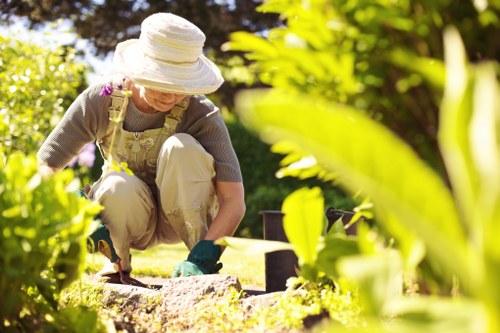
Conclusion: Embrace the Beauty of Landscape Gardening in Hayes
Landscape gardening in Hayes offers endless opportunities to create a personalized and enchanting outdoor space. By carefully planning your garden, selecting the right plants, and implementing sustainable practices, you can cultivate a thriving garden that enhances your property's beauty and value.
Whether you're a seasoned gardener or just starting, embracing professional services can elevate your landscape to new heights, ensuring a harmonious and picturesque environment for years to come.
Don't wait to transform your outdoor space—contact us today to begin your journey towards a stunning landscape garden in Hayes.